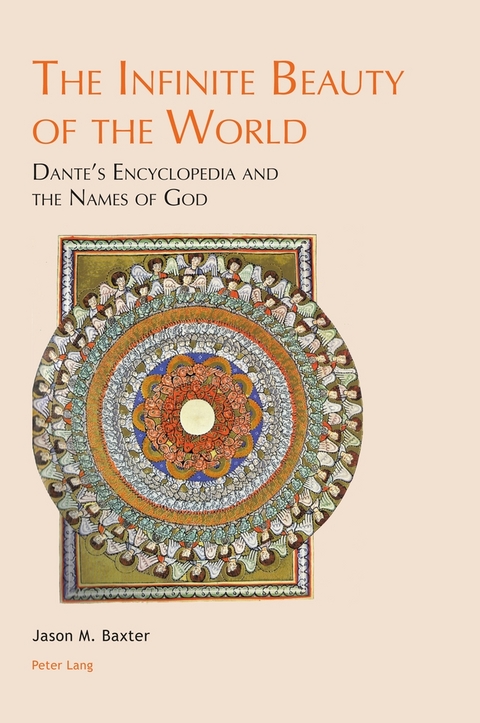
The Infinite Beauty of the World
Dante’s Encyclopedia and the Names of God
Seiten
2020
|
New edition
Peter Lang International Academic Publishers (Verlag)
978-1-78874-395-2 (ISBN)
Peter Lang International Academic Publishers (Verlag)
978-1-78874-395-2 (ISBN)
This book proposes a radically new interpretation of the Divine Comedy’s encyclopedism by focusing on Dante’s work in light of the medieval imago mundi tradition. By bringing attention to Latin Platonism and twelfth-century authors, the work provides compelling new readings and provocative insights into key figures (e.g. Ulysses).
This book proposes a radically new interpretation of the Comedy’s encyclopedism by focusing on Dante’s work in light of the medieval imago mundi tradition. The work opens with a discussion of how the Florentine poet transgressed every generic boundary in his effort to gather «into one volume» a vast and varied set of creatures, places, landscapes, historical and mythological persons, weather conditions, and arts. It then goes on to show that this extraordinary encyclopedic breadth should be understood in the terms of Boethian and Augustinian spiritual exercises of envisioning the whole world in the mind’s eye, which themselves became the interpretive framework for the spiritual ends behind medieval encyclopedic texts. By bringing attention to Latin Platonism and twelfth-century authors (such as Alan of Lille, Bernard Silvestris, William of Conches, Hugh of St. Victor, and Thierry of Chatres), this book provides compelling new readings of the De vulgari eloquentia, as well as provocative insights into key figures (such as Brunetto Latini, Pier della Vigna, and Ulysses) and key passages (Purgatorio 28, Paradiso 26, and Paradiso 33).
This book proposes a radically new interpretation of the Comedy’s encyclopedism by focusing on Dante’s work in light of the medieval imago mundi tradition. The work opens with a discussion of how the Florentine poet transgressed every generic boundary in his effort to gather «into one volume» a vast and varied set of creatures, places, landscapes, historical and mythological persons, weather conditions, and arts. It then goes on to show that this extraordinary encyclopedic breadth should be understood in the terms of Boethian and Augustinian spiritual exercises of envisioning the whole world in the mind’s eye, which themselves became the interpretive framework for the spiritual ends behind medieval encyclopedic texts. By bringing attention to Latin Platonism and twelfth-century authors (such as Alan of Lille, Bernard Silvestris, William of Conches, Hugh of St. Victor, and Thierry of Chatres), this book provides compelling new readings of the De vulgari eloquentia, as well as provocative insights into key figures (such as Brunetto Latini, Pier della Vigna, and Ulysses) and key passages (Purgatorio 28, Paradiso 26, and Paradiso 33).
Jason M. Baxter is Associate Professor of Humanities at Wyoming Catholic College. Trained at the University of Notre Dame, his research has focused on the Boethian commentary tradition, the twelfth-century poet, Bernard Silvestris, and the influence of Latin platonism on Dante. He is also author of the introductory A Beginner’s Guide to the Divine Comedy, published in 2018.
CONTENTS: From Macrobius’s Sacrum Poema to Dante’s Comedìa – The View from Above and the Vision of the Heart – Universaliter et Membratim: The Imago Mundi and Dante’s Volume – The Failed Encyclopedism of Hell – The Garden of Eden and the Universal Garden – Innominis/Omninominis: Dante, Mirrors, and the Infinite Names of God in Paradiso – Nova Creatura and Canticum Novum.
| Erscheinungsdatum | 24.08.2020 |
|---|---|
| Reihe/Serie | Leeds Studies on Dante ; 4 |
| Mitarbeit |
Herausgeber (Serie): Claire E. Honess, Matthew Treherne |
| Verlagsort | Oxford |
| Sprache | englisch |
| Maße | 152 x 229 mm |
| Gewicht | 282 g |
| Themenwelt | Geisteswissenschaften ► Religion / Theologie |
| Geisteswissenschaften ► Sprach- / Literaturwissenschaft ► Literaturwissenschaft | |
| Geisteswissenschaften ► Sprach- / Literaturwissenschaft ► Romanistik | |
| ISBN-10 | 1-78874-395-4 / 1788743954 |
| ISBN-13 | 978-1-78874-395-2 / 9781788743952 |
| Zustand | Neuware |
| Haben Sie eine Frage zum Produkt? |
Mehr entdecken
aus dem Bereich
aus dem Bereich
Buch | Softcover (2020)
Beuth (Verlag)
CHF 27,85


